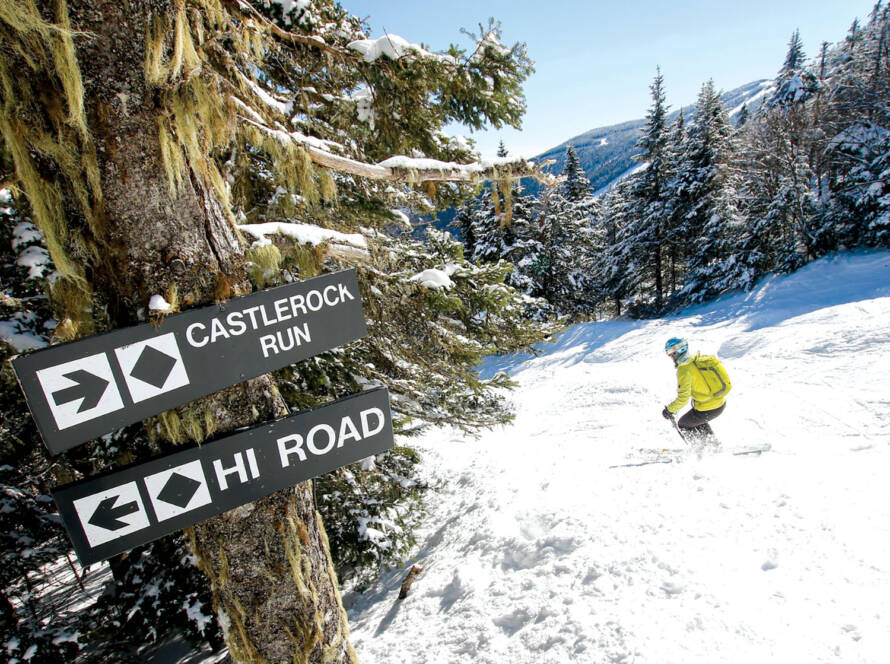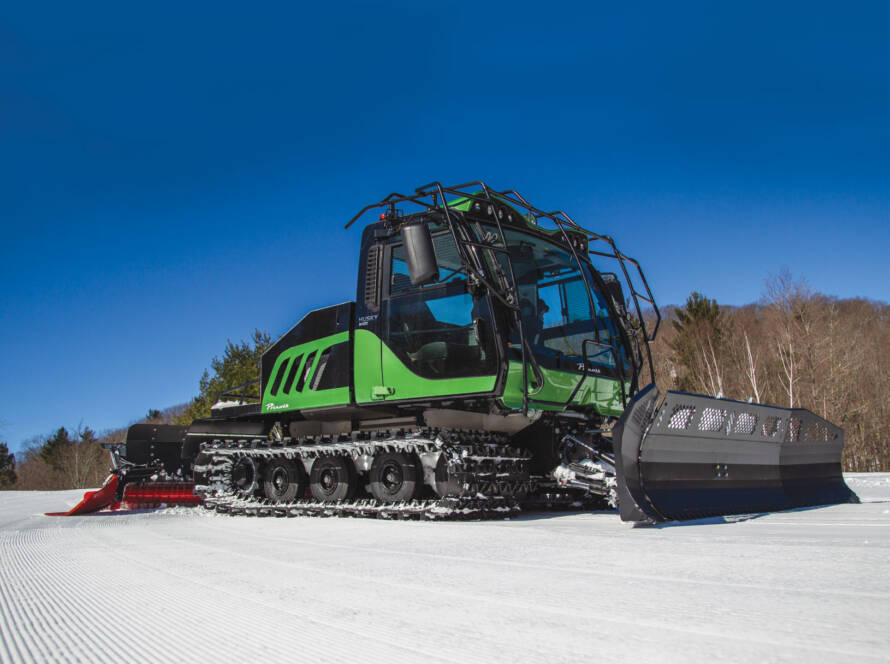In the pandemic environment, Purgatory Resort has proven to be the opposite of its name, as the Covid-19 pandemic has helped the resort differentiate itself in a positive way.
As other resorts were completely shutdown or experienced their worst ski and snowboard season in years, Purgatory is uniquely positioned not only to excel, but set itself up for a prosperous future.
Nestled within the San Juan Mountain Range about 30 miles north of Durango in southwestern Colorado, the area has a serviceable airport, but Purgatory is seen as more of a local resort as most attendees drive in from nearby states – sometimes as far as Albuquerque, N.M. Typically, if a resort were trying to boost attendance or build international prestige, not having thousands of people fly to the resort every year would be perceived as a negative. However, during a pandemic, when international travel is either banned or discouraged, drivability pays dividends.
“Covid is both a challenge and one of the things that’s differentiating us,” said Dave Rathbun, general manager of Purgatory Resort. “We’re a little bit off the beaten path. The place doesn’t get skied out on a powder day like it does at some of these other mega resorts. It’s a quiet little gem that allows us to give people a great, more wide-open experience that’s harder to come by at busier resorts. A busy day here is 5,000 people and they’re either driving in from a nearby state, sometimes as far as New Mexico, or they’re driving 10 to 15 hours in their cars from Dallas, New Orleans, or even Southern California, so it’s a good mix of locals and those from further afield.”
Since skiers and snowboarders can get to Purgatory without the need to fly, the resort staff are not overwhelmed, and guests can have an enjoyable experience without the health and safety concerns that can be found at larger resorts that are closer to urban centers.
“Covid is helping us spread peak day demand into the off-peak, midweek periods, bringing our peak day volume down and off-peak volume up, making the business model more consistent and efficient, which translates to a better guest experience,” said Rathbun.
So, what are the guests experiencing? How about 1,600 acres of skiable terrain, 105 trails, 11 lifts, multiple terrain parks, a vertical drop of over 2,029 feet and a 40-foot-tall and 5,000-foot-long mountain coaster that goes up to 25 miles per hour called The Inferno? Plus, for the more adventurous, 35,000 acres of catskiing – the largest catskiing acreage in North America, according to Purgatory – with fresh powder and runs that are so far from the actual resort, it requires one to two weeks to build the roads to get there. Some roads require a winch cat and one is built on a frozen waterfall.
“There’s one zone where we can actually see the ski area and the chairlift and we’re so far from the ski area in that zone that you can’t even see people on the ski runs. You can kind of see the outline of runs cutting through the trees, but you’re in a different world,” said Grady James, Purgatory’s lead guide for its ski and snowcat adventures.
Of course, for those looking for a more traditional ski resort experience, as a beginner to intermediate resort, Purgatory has them covered.
“We’re a full-service resort with on-site lodging, dining and shopping. We run horse-drawn sleigh rides, snowshoeing and cross-country skiing and normally we run a tubing operation, but we’re not running that this winter due to Covid-19,” said Sam Williams, Purgatory’s director of operations.
However, while they lose some attractions due to Covid-19, what the guests gain are fewer people on the runs, which translates to an overall atmosphere that’s more relaxed, less busy and elicits the feeling of more wide-open runs to ski down.
“We’re not making people ride together to maximize lift capacity. What’s ended up happening is more people are waiting in lift lines versus being on the hill skiing, so it’s opened up some of the runs a little bit, and we’ve seen a small decrease in collisions and other accidents on the hill usually caused by crowding,” said Williams.
For Purgatory’s staff, it’s a lot of work to maintain social distancing and sanitize more frequently while also maintaining 50 percent capacity, but they were able to do it all successfully this past season. The pandemic has forced Purgatory to examine where it can be more efficient to take its services into the future much sooner than it would have otherwise.
“Last summer, being faced with capacity limitations, we decided to change the product mix of the types of activities we offered and even the timeframe we offered them in, so we divided our summer operating day in half and sold a morning session and an afternoon session. That worked so well, we’re going to continue to do that whether there’s Covid this summer or not,” said Rathbun.
Like other businesses, Covid-19 has forced Purgatory to embrace technology at a much faster rate, but they’ve taken it further than just allowing guests to book their ski experience online. Guests can now order food through the Purgatory Online E-Store from anywhere in the resort and get notified for pick-up when it’s ready.
“What was forced on us as a necessity with Covid is going to be something we can continue to leverage moving forward. It’s just going to be so much easier to order your food in advance, get a text or e-mail to let you know when it’s ready and then when Covid’s gone, you’ll just go in, pick up your food and grab a seat,” said Rathbun.
Of course, Covid-19 is temporary and technological innovations are nice, but it’s not what keeps people coming back. That would be the low-key family atmosphere, the emphasis on fun and the fostering of a love of skiing in future generations. This is why Purgatory offers a deal where kids under 10 ski free. This is such a part of the resort’s values that for the 2022 season, the policy will be expanded to kids 12 and under.
“The mission is giving all people the freedom to ski. James Coleman, the primary owner, is definitely focused on having this be a lifelong adventure that starts at a young age. People can come and keep coming year after year. The hope is they grow up, get married, have children and then have their children learn before becoming grandparents and enjoying the whole family on the mountain,” said Heather Garland, director of human resources at Purgatory.
As a result, generations have skied Purgatory since its founding by forest ranger Chet Anderson and oil man Ray Duncan in 1965.
“So many of our guests and our employees grew up skiing here and some of them have been here for 40 years. This is definitely a family-focused resort and those families have awesome experiences here,” said Garland.
That makes many of Purgatory’s 645 staff (900 during high season of a normal year) deeply invested in the resort’s success on a level deeper than just taking pride in a good day’s work. Many of them will go to the mat for Purgatory because they love it so much, especially when it comes to keeping the resort open day in and day out in the face of another global challenge – climate change.
“My job is to plan for the worst and hope for the best, as average snow fall for the season isn’t average anymore. We’re going to hit our gallons no matter what. We have X amount of white that we need to put on the hill that we know will cover everything with a decent surface to get us through the season. We’ll put that out every season regardless and you hope Mother Nature comes through and helps you get the rest of your terrain open,” said Josh Hamill, slopes manager at Purgatory who has worked at the resort for 20 years and now leads a crew that includes back-to-back winners of Colorado Ski Country USA’s Groomer of the Year award in 2018 and 2019.
“Sometimes it just comes down to creative grooming. Sometimes we build some snow forms and you just do everything you can to make the product happen and keep people skiing,” said Hamill.
Assisting his crew in that creativity are three Prinoth Bisons as the fleet cats, the older Prinoth 350 for the terrain park cat and the winch cat is a Prinoth Winch, along with a Bombardier BR275 with a 13-foot saw on the front for shaping halfpipes. All of them run in two eight-hour shifts, seven days a week from November through April.
That kind of non-stop dedication doesn’t end with snow grooming. Purgatory happens to be further from urban centers than larger resorts in Colorado, like Aspen or Vail, so with potentially further to drive and fewer options for housing in the surrounding area, Purgatory’s staff are a particularly dedicated bunch who do it for the love of the lifestyle and the resort itself.
“We have excellent employees among our core staff that have been here a really long time. We’re adaptable and flexible enough to deal with whatever comes our way. You never know what to expect season to season so having that savviness to navigate through whatever challenge comes our way has really helped this resort sustain since 1965, and helped us create memorable experiences for our guests and staff through it all,” said Garland.

